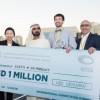Invention Could Change the Face of Industrial and Consumer Electronics
A team of scientists from the US Department of Energy's Brookhaven National Laboratory is using nanotechnology to eliminate optical reflections from glass, silicon, and plastics. "Invisible Glass" - designed to enhance solar energy-conversion efficiency, eliminate glare from smartphone and computer displays, and provide anti-fogging, water-repellant properties for car and aircraft windshields - has been awarded the grand prize of $20,000 in the 2018 "Create the Future" Design Contest, produced by Tech Briefs Media Group.
 An unprecedented initiative supported by the United Arab Emirates
An unprecedented initiative supported by the United Arab Emirates

 By Raghu Das, CEO, IDTechEx
By Raghu Das, CEO, IDTechEx ZAPINAMO (pronounced ZAP-IN-A-MO), a Coventry based Electric Vehicle [EV] Charging infrastructure innovations company, has developed a patented EV Charging system utilising Battery Stored energy to 'Power Boost' a nominal Grid supply into a rapid or ultra-fast charge unit. This reduces the amount of time it takes to replenish the EV battery. Typically, a home charge unit will provide 4 miles of charge per 30 minutes into the EV battery, whereas a ZAPINAMO HUBZ unit power boosts it to 50 miles in 30 minutes from a domestic supply.
ZAPINAMO (pronounced ZAP-IN-A-MO), a Coventry based Electric Vehicle [EV] Charging infrastructure innovations company, has developed a patented EV Charging system utilising Battery Stored energy to 'Power Boost' a nominal Grid supply into a rapid or ultra-fast charge unit. This reduces the amount of time it takes to replenish the EV battery. Typically, a home charge unit will provide 4 miles of charge per 30 minutes into the EV battery, whereas a ZAPINAMO HUBZ unit power boosts it to 50 miles in 30 minutes from a domestic supply. BioID, the pioneer for ”Biometrics-as-a-Service”, has announced a cooperation with Munich Startup Keyp. Integration of BioID’s biometric authentication into the Keyp identity ecosystem assures a comprehensive customer journey that is secure and convenient. Face recognition with liveness detection from BioID is used device-independently without the need of special hardware like a 3D camera. Clients of the „Keyp Identity Platform-as-a-Service“ can incorporate biometric authentication for their processes simply by means of drag-and-drop.
BioID, the pioneer for ”Biometrics-as-a-Service”, has announced a cooperation with Munich Startup Keyp. Integration of BioID’s biometric authentication into the Keyp identity ecosystem assures a comprehensive customer journey that is secure and convenient. Face recognition with liveness detection from BioID is used device-independently without the need of special hardware like a 3D camera. Clients of the „Keyp Identity Platform-as-a-Service“ can incorporate biometric authentication for their processes simply by means of drag-and-drop. World's biggest awards in civilian applications of drones and robotics technology select top projects after three-day live contests in Dubai
World's biggest awards in civilian applications of drones and robotics technology select top projects after three-day live contests in Dubai














































































